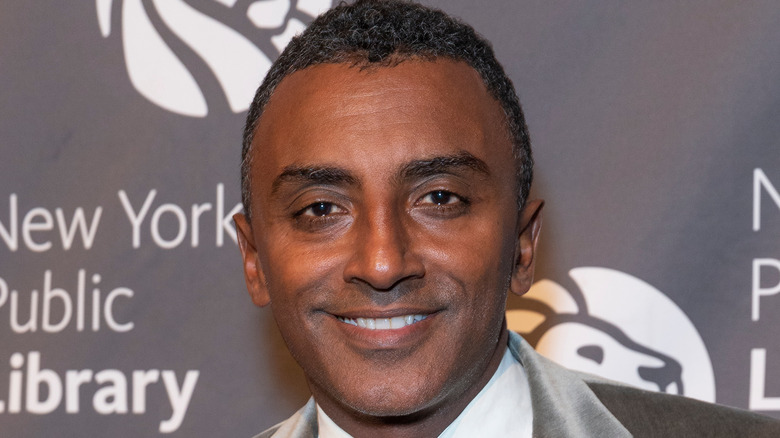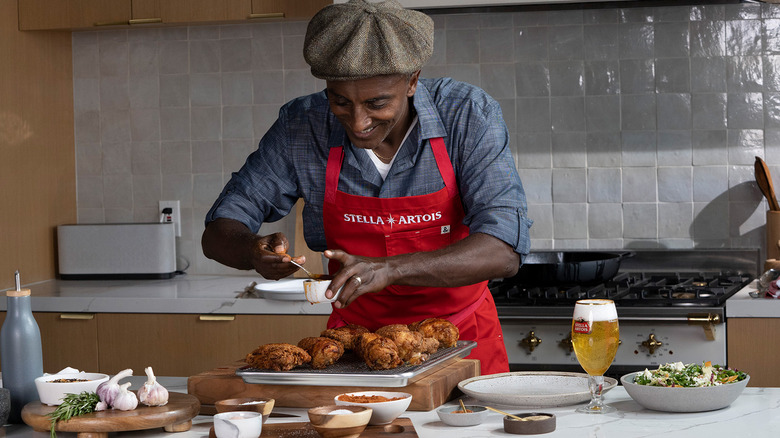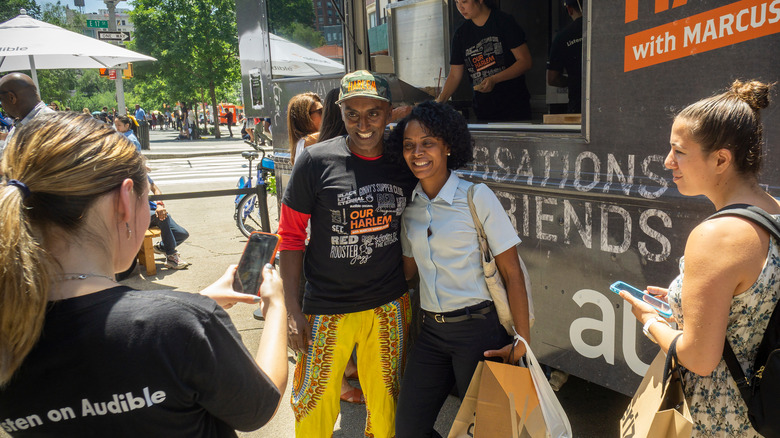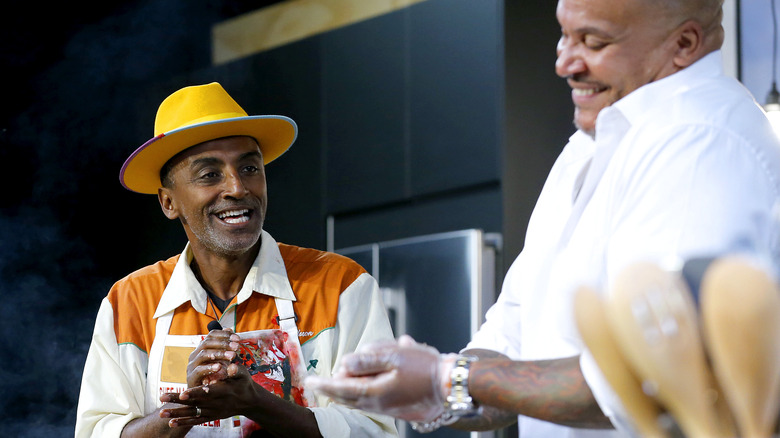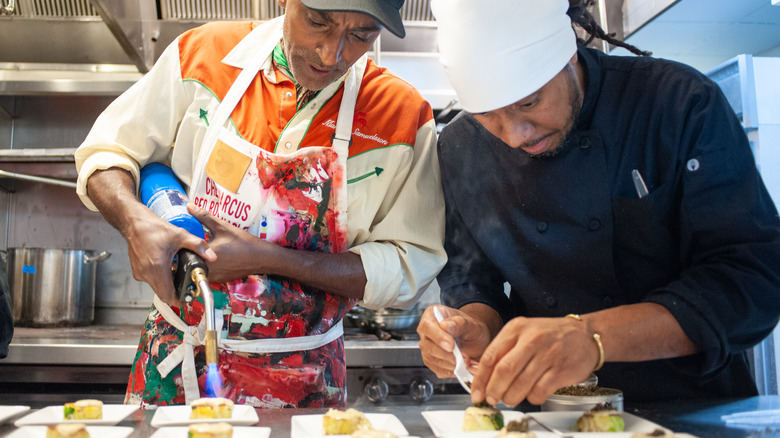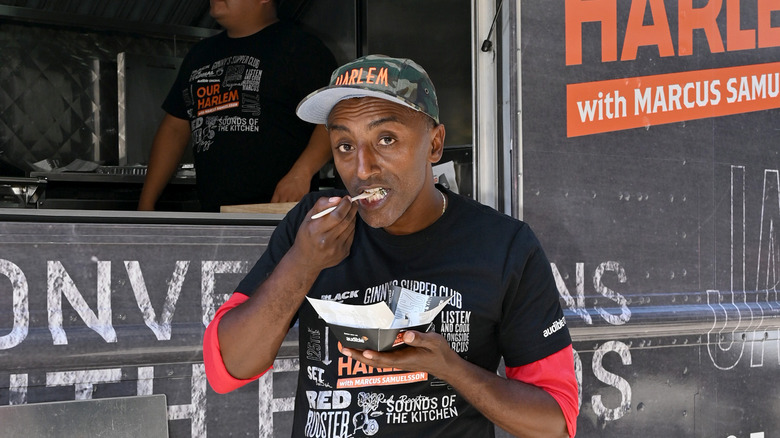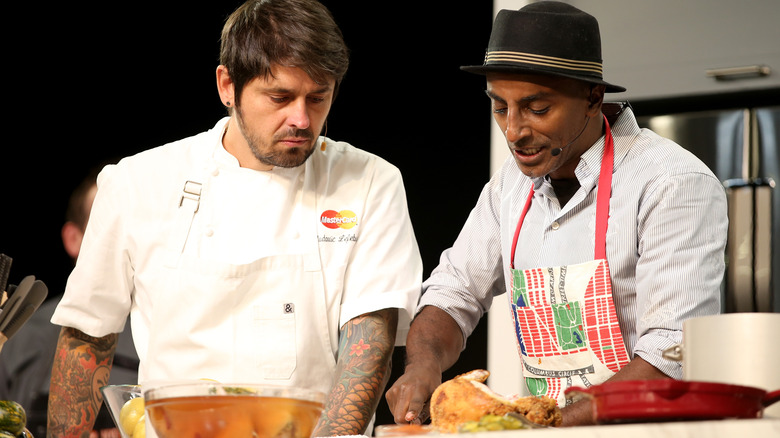Chef Marcus Samuelsson Talks About His Famous Fried Yardbird - Exclusive Interview
Chef Marcus Samuelsson isn't one to slow down. Samuelsson has acted as a judge who selects the winning dish on the staggering 49 seasons of "Chopped," which first hit air in 2007. Samuelsson has also traveled the world for his food show "No Passport Required" for two seasons and counting on PBS. Last year, he released his latest cookbook, "The Rise: Black Cooks and the Soul of American Food" and cooked with actress and singer Selena Gomez for an episode of her HBO show "Selena + Chef." Not bad for a global shutdown.
This year, while many of us are still learning how to be in public again, the acclaimed chef is re-opening Marcus Bermuda. In fact, he was in Bermuda when he recently caught up with Mashed. Samuelsson spoke about his latest philanthropic endeavor of offering the recipe of his signature version of the Fried Yardbird in the form of a NFT (non-fungible token) to benefit the James Beard Foundation's Food and Beverage Investment Fund for Black and Indigenous Americans. The package features a digital file of the coveted recipe in partnership with Stella Artois for its "Chef's Special NFT Collection," a digital rollout with food-centric NFTs throughout the summer to support restaurants. Samuelsson talked about the iconic sandwich from his famed NYC eatery in the heart of Harlem, Red Rooster, as well as blending food cultures and where he likes to eat late-night in Los Angeles.
Marcus Samuelsson talks about his take on the Yardbird sandwich
You have restaurants all around the world, so what makes the Fried Yardbird special?
Well, it's very special to me. It's one of the recipes that we built Red Rooster on, and I feel like a lot of my guests have an interaction, a memory of either having it there or having it at another place. And I just felt like that it would be fun.
How did you come up with the Fried Yardbird?
Well, first of all, I think that the whole collaboration together with Stella and the James Beard Foundation and just been reading a lot about NFTs, and somebody that is creative and part of the arts world and the food world, I just felt like this would be fun and also goes to a great cause. So, it was really about what is the most iconic, most fun, memorable recipe that people will be excited about.
We're curious about the origins of the dish itself since it is such an iconic dish.
I mean, many cultures, especially American culture, but a lot of cultures in the world, have a relationship with fried yardbird. But the way, when you call it yardbird, the way we think about it, for me, it definitely has origin in African-American cooking and also knowing the history with the restaurant Red Rooster, where it is in Harlem and Overtown. Also, the fact that the NFT and partnering with James Beard Foundation will also go to a specific black and minorities-driven fund ... I just think it's a great collaboration.
American Food is about blending traditions, says Marcus Samuelsson
To just build on that, especially as the pandemic continues to create challenges for restaurants, can you tell us a little more why these funds specifically are so important?
Yeah. I mean, we're at a loss, where we're at a very, very challenging time for all — a lot of restaurant entrepreneurs in the food business, right? But specifically for black and brown businesses that have traditionally not had access for institutional money, and there's a huge wide wealth gap. So, businesses like restaurants — like food trucks, like catering firms that are very much in our communities are going through a very, very difficult time — we have to support one another, and coming together and creating either direct funds or highlighting the issues so people are aware and driving people's attention to businesses of color.
You've celebrated and shown the diversity of culinary traditions in American cuisine, and that continues to be shaped by the immigrant experience. Could you talk about some myths of what American cuisine is that you'd want to set straight?
Well, I mean, American cuisine is going to be always evolving because as generations we evolve. There's always a blend between immigrants and their traditions and indigenous people adding on and adding on. And what we've done for a long time, we focused a lot on, let's say European American food. We know as a diverse, layered nation that there's been huge contribution by African-Americans to the American food experience and that's something that I wanted to highlight with my work in the restaurants, but also through my cookbook, "The Rise." To be thinking about four cuisines in America that are [a] direct link to it, whether it's barbecue, Southern food, Lowcountry and Korean cooking, those are all linked to an African-American experience.
Marcus Samuelsson's tips for making copycat recipes at home
We have a sweet spot at Mashed for taking restaurant favorites or any sort of well-known recipes and making them at home. Do you have, in general, any tips for recreating and putting your own spin on a copycat recipe?
Well, in this NFT with a Fried Yardbird, this is definitely, hopefully, bidding goes on and hopefully somebody is inspired to cook it at home. And it's a fun recipe that there are some, like all recipes, there are some do's and don'ts, you know what I mean? Here it's like, I'm very specific about what cut, how to fry it, the crunch, what needs to happen. So, I think going to restaurants is such a huge part of being inspired for where we are in American food. Then go home and maybe research it online or buy the cookbook, and then try to make that dish. That's all about what sort of food can inspire us to try new food or try new cuisines or go to a place where you may have not gone before. That's all part of cooking and dining where that's what makes it so special that you can really enter a different culture and learn something. You can learn it initially by breaking bread, but also by making the food and hopefully, this inspires people to try something new.
How Marcus Samuelsson's grandmother taught him ritual instead of recipes
When you spoke with Mashed last, you mentioned that your grandmother taught you rituals instead of just recipes when it came to cooking. How do you use that mindset in your own cooking?
Well, ritual has been around much longer than just traditional recipes, right? And rituals for me, it's also very much word of mouth. I don't think my grandmother ever shared a pure recipe with me. It was really, this is how we do it as the Samuelssons and this was taught from, she was taught it by maybe her auntie or her neighbor or somebody in her community. And that's so special. Every time I cook I think about my family. Very often, especially when [it's] something Ethiopian or Swedish.
It's something that the James Beard Foundation tried to highlight or something like Stella, you think about family, extended family. Stella has been [a] huge part of the restaurant community right during the hardest time we've ever had, so it's not just your direct family. Nurturing rituals is key and it's kind of the core [of] what makes that extended family, whether it's the cooks that you work with or the restaurants you go and support. But I just think it can be found in the work that I do in my restaurants, but it also can be found in the partners that I work with as well.
Marcus Samuelsson eats like the locals when on the road
Is there a dish that you like to have, since you do travel so much, that you enjoy as comfort food on the road?
[I'll] tell you right now, one of the reasons why I was a little bit late, I'm here in the Bahamas opening our new restaurant, our Marcus restaurant. It's been all about the conch. It's been so much fun eating local conch and a lot of our chefs are from this island and they bring in their moms or their family members. Conch for us being, we translate that and try to do our version of that in the restaurant. It's just been a lot of fun cooking again with a big crew, and it's been inspiring for me and it's something that, as a chef, I need to be in the kitchen. It's just been a lot of fun being here in Bahamas, opening Marcus restaurant here in Baha Mar with a young, super inspirational team. So, I would say, conch.
Just the last question, do you have a favorite guilty food pleasure that you could share?
I'd probably say, I mean, I don't know if it's guilty food, I just love late-night tacos in LA., or when I'm on the West Coast especially. It becomes later because it's just one of those runs that I like to do late, go on Lincoln and just one of those taco stands that are just open late. It's just so much fun. And some of the best restaurants in LA are on the street, I love that.
They always have the best salsa too.
Yeah, they do.
Marcus Samuelsson's take on the perception of Ethiopian and Swedish cuisine
I personally love Ethiopian food, not just for the flavors, but also for the community it creates at the table. Could you recommend a starter dish for someone who is new to eating Ethiopian food?
Well, I think that the injera bread itself is so special. The sourness, the way you break bread is a very special meal every time you can do it. I think that just eating beef kitfo, which is really a warm beef tartare, it's such a different way of eating tartare meat. When you think about the tradition of that, it's actually, it has thousands of years of history and you, not only is the bread unique, the kitfo itself is unique and it just hits the spots on delicious and also something very different that has a rich history.
Do you have, or have you noticed there's a misconception people have about Swedish food?
I think that Swedish food has come really, really far and it's been helped by sort of, if you think about the last 10, 15 years what's happened with the new Nordic and people are traveling more to Stockholm, Copenhagen and so on. I think the chef community has done great by making Scandinavian food more available and interesting. And you have obviously incredible restaurants, that really pushed the envelope. But smoking, pickling, and preserving, cooking more seafood, cooking more game, those are all traditions that are Scandinavian, but they are shared by other cold-weather countries, right? So you can cook, you can be in Northern Canada or Alaska, and you are not in Sweden, but the cooking techniques and rituals are very similar because it's climate-based.
Keep up with Marcus Samuelson on his website and social media. Visit Charitybuzz.com to find more ways to support the restaurant industry and other causes.
